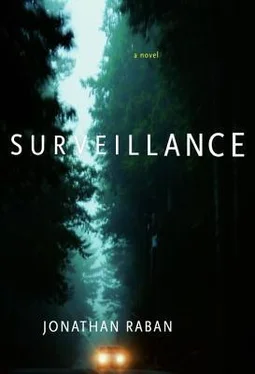“IF I WAS TALKING about anything at all,” Tad said after the landlord left, “I hope I was telling him how to grow orchids or peonies.”
“You were making all that up?”
“Pardon my French, kiddo, but one load of bullshit deserves another.”
“But why? He was only asking a question. ”
“He just dropped in to terrorize us.”
“ Terrorize ?” Alida felt like the floor was giving way beneath her feet, and there was a long, long way to fall. “He was only trying to make us safer.”
“Oh, Rabbit…” Her mom slid into the landlord’s vacated chair and laid her arm across Alida’s shoulders, then looked at Tad. “Is he going to triple the rent, do you think? Or turn us into a multistory parking garage?”
“ Parking garage ?”
“Honey, listen. Mr. Lee bought our building. He bought it to make money, and all he talked about, like new plumbing and video systems, costs big money — maybe millions. It was like he was telling us we can’t afford to live here. That’s what Tad means by ‘terrorize.’”
The room swam in and out of focus as Alida fought a humiliating upwelling of tears. “I still don’t get it.”
“We pay eight-fifty for this apartment.”
“Seven for mine,” Tad said.
“Which is incredibly cheap. Mr. Winslow never put up the rents, he just let us live here for almost nothing, compared with most places around here. Parking lots! I bet the horrible Mr. Lee makes more money out of one parking space than he does out of our entire apartment.”
“That’s not true!” Alida recognized home territory when she saw it. “Even if he made five dollars an hour, twenty-four hours in every day, with every single space, that’d be like…” She calculated furiously, squinching up her eyes and holding her breath. “Eight-forty. But it’s not that much! There’s all that Early Bird stuff, and evenings, and weekends, and tons and tons of empty spaces all the time. You have to average it out.”
She was shocked by her own arithmetic, having expected the sum to come to much less than it did; for one single lousy parking space, that was, like, extortionate. Nevertheless, she tried to put a brave face on the figure. “I bet he’d be lucky to get two hundred a week.” She raced over the last few words to minimize their impact, but felt her mom’s grip tighten on her shoulder.
“We pay eight-fifty a month, honey, not eight-fifty a week.”
Crushed, Alida forced a wobbly grin and dared herself to voice the thought that had just come to mind. “Well, I guess you could get maybe eleven ‘Compact Only’ spaces into this apartment.”
There was an uncertain moment of silence, then her mom and Tad began to laugh, and Alida felt instantly buoyant at being the cause of such appreciative adult laughter.
Strange how by saying the very worst thing you could imagine about almost any situation, you could make it funny — sort of. “So we’ll have to live in the Spider and the heap,” she said, but a treacherous, wavering hiccup came into her voice on the word “Spider,” and Tad reached for her hand, not laughing now, as she had meant him to do, but just smiling, like he wanted to reassure, and to Alida it looked plain scary.
“Ali…”
Whatever he was saying was lost in a brain-curdling shivaree that came through the open window — a crazy concatenation of whoops and warbles, yelps and wails, as a parade of emergency vehicles went by a few blocks away. It sounded like they were heading south on Second. Alida picked out the jarring chords of fire trucks and their deep, grunting blasts; the angry tirra-wirra-wirra-wirra of the police; the caterwauling ambulances. From the noise they made, you’d think that all hell had broken out somewhere in the city, but lately the sound had grown so familiar that you just had to shut your ears to it. You never discovered where the sirens were going, or why, but most days you’d hear them racing along I-5 or the waterfront, like they were out there for the simple fun of frightening the pants off everybody with their mad music.
Tad got up to pull the window down, which slightly dulled the racket from outside. “Act Three of the exercise, I guess,” he said. “They must’ve needed me for only Acts One and Two.”
“When does your lease run out?” her mom said.
“September.”
“Ours is December.”
Alida said, “Are you sure we…I mean, like with his weird English and all, couldn’t he maybe just mean…” Impatient with herself for sounding so dumb, she bit down on her lip. “Suppose it’s all just a big misunderstanding? He didn’t have to be lying.”
“You’re right, Rabbit. We’re jumping to conclusions. We shouldn’t prejudge him like this. Perhaps he really did mean what he said.”
But in her mother’s face, Alida saw all the signs of grown-up untrustworthiness — the uncertain tremor in her smile, the sidelong glance at Tad that meant We’ll talk about this later. Everything was impenetrably “ironic,” a maddening equation full of minus numbers. Mr. Lee didn’t mean what he said, and her mom didn’t mean what she said about Mr. Lee. If Mr. Lee was — x and her mom was — y …
Another procession of horns and sirens. This one was going west down Jackson Street, its ferocious clamor muffled by the bulk of the buildings in between.
“God, it’s like being at a Schoenberg concert tonight,” her mom said.
“I was thinking more John Cage.”
Adults!
What had Mr. Lee actually said ? That he didn’t want the street people getting in. That he was going to put new locks on the doors. That he was new to being a landlord. That he wanted “feedback.” How did you get from such data to the idea that he was going to turn the Acropolis into a parking garage? Surreptitiously, Alida squeezed a zit on her chin. She thought of the landlord installing a video monitor beside the door, of how she’d innocently believed in it, but now she believed nobody — not Mr. Lee, not her mom, not Tad, and herself least of all. She felt lost in the fog of her own stupidity. The zit popped, discharging a little bead of pus onto the tip of her forefinger, which she wiped on the grainy underside of the table.
Tad said, “Don’t worry, Ali. You, me, and your mom, we’re a team. We’ll be fine, whatever happens with the building.”
But Alida knew differently. She wasn’t on the team. She was sitting out on the bench, wearing cleats and the team jersey, but the coach would never let her play on the field. Blinking back tears, she made herself smile and say “Okay,” thinking that this was the first time in her life she had been dishonest with Tad, ever.
BACK IN HIS APARTMENT, alone with mouse and keyboard, Tad Zachary was on his usual late-night prowl through cyberspace. He’d long ago given up on television as a source of news. More recently, he’d canceled his subscription to The New York Times, whose reporters he had learned to despise as tame flunkies of the administration. Now he mostly read foreign media to find out what was happening in his own country. His rusty high-school French was just sufficient, and growing steadily better, to skim Libération ’s accounts of what was going on in La Maison Blanche and Le Bureau Oval. He moused over to Britain, where he read the Independent and the Guardian, and on to Arabia, where he checked out the Jordan Times and Al-Ahram Weekly. He visited Al-Jazeera. Then he hit the blogs and forums to keep company with like-minded internal exiles — those lonely late-nighters, as full of rage as he was, tapping out intelligence on the latest mendacities and misdeeds. His face lit by the frigid blue glow of the computer screen, Tad followed these theories and rumors as they swarmed from site to site.
Читать дальше












